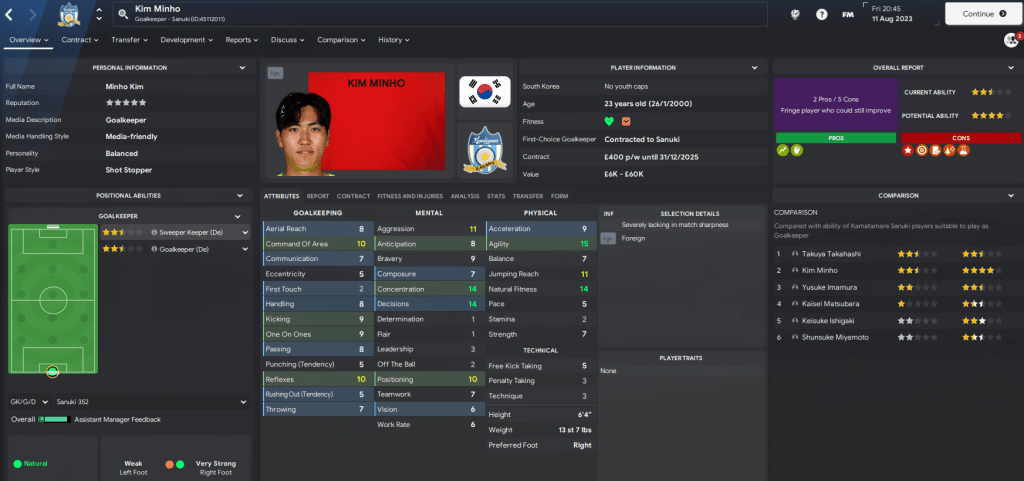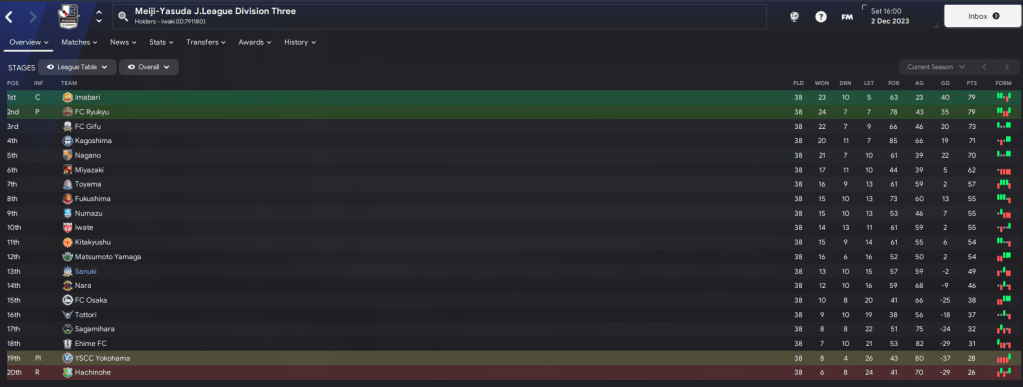Robaato Rasamu was a little taken aback at how quickly he’d managed to fall into a job in football management. He’d only spent 13 days as an unemployed and inexperienced Football Manager yet Japanese third-tier side Kamatamare Sanuki had deemed him the ideal option for their vacant managerial role.
Rasamu realised he’d foolishly promised not to make any staff changes during his Sanuki interview. So any much-needed staff adjustments would have to wait until the end of the campaign. He spent a couple of days working on a training routine and watching his new players on the training pitch, which helped him immediately spot a couple of glaring issues. Firstly, the club seemed to have a total void of central midfielders. Secondly, there didn’t seem to be a natural goalscorer at the club. Both of which, are pretty big problems for any football club, regardless of your philosophy.
The renowned thesis he had written, which helped him gain a footing in football management, had discussed the need for managers not to be restricted by a specific style of play. And with that in mind, Rasamu was open to different formations and approaches based on the players available to him. A couple of areas where Sanuki were well-stocked were centre-back and full-back, which prompted Rasamu towards a 3-5-2 approach. He also needed to try and get the best out of star player Yuto Mori, so opted to play him in a relatively familiar attacking midfield role. However, the below approach would soon evolve into two central midfielders and a single holding midfielder.

Into the J3 League
If you’re not au fait with the Japanese leagues, it consists of three playable leagues – the top-tier J1 League, the J2 League and the J3 League. J3 League has two promotion places, one automatic relegation place and a relegation playoff for the team finishing 19th.
Sanuki were huge favourites to be relegated from J3 League with title odds of 250/1 compared to the next highest odds of newly-promoted sides FC Osaka and Nara (150/1) and Tottori (100/1). The favourites are Imabari (4/7), FC Gifu (6/4), FC Ryukyu (15/8) and Iwate (7/2). However, Sanuki found themselves sitting 13th with 24 points after 18 games, nine points clear of 19th-place Tottori. Imabari looked to be delivering the expected promotion as they were on 41 points, two clear of Kagoshima and seven clear of Ryukyu. Entertainment had been at an absolute low in Sanuki games, scoring just 17 and conceding 19 in 18 matches.
Rasamu’s managerial career began with a big game at fellow relegation candidates FC Osaka, who had former Barcelona wonderkid Jean Marie Dongou up front. Rasamu’s team started well and took the lead with a superb counter-attack from an Osaka corner, with the ball ending up with Himan Morimoto floating the ball over the top for his strike partner Kaima Akahoshi to tuck home just his second goal of the season. But goalkeeper Takuya Takahashi threw that lead away by letting in a tame 30-yarder and then being chipped from 25 yards. Akahoshi thought he’d levelled things up in injury time, only to be ruled narrowly offside. But Rasamu saw plenty of positives, given they had more shots and xG but they lost right-back Takashi Kanai for six weeks.

The Sanuki supporters got their first look at Rasamu as they welcomed 11th-place Fukushima to Marugame Stadium. And they wouldn’t have been impressed by a first half that Fukuhashi dominated and again scored a long-range strike. But Rasamu offered a glimpse of his tactical nous after the break, shifting to two central midfielders and his side suddenly seized control. Midfielder Hayato Hasegawa teed up an equaliser for Akahoshi, who five minutes later sent Morimoto through to calmly convert. And Robaato Rasamu had his first win as a Football Manager.

Two more big games followed with trips to teams expected to struggle. First up was Sagamihara, where they started well with Mori setting up Akahoshi before Rasamu was delighted to see his newly-instilled short free-kick routine work as Mori created another for Akahoshi. The hosts scored in injury time but Sanuki held on to claim Rasamu’s first away victory – despite having seven shots to 18. Next up was Nara Club, who were also overperforming in 9th. Akahoshi scored again on eight minutes but Nara were soon level with a ridiculously good free-kick. Morimoto responded with a stunning 25-yard strike, which won the August goal of the month, but Sanuki were wasteful and Nara came back to get a 2-2. However, Rasamu was yet again delighted with the team’s efforts as they had significantly more shots and xG.
Takahashi’s issues prompted Rasamu to make his first transfer, agreeing on a pre-contract deal with 23-year-old Korean keeper Kim Minho and then signing him for £3k from Nagano. Minho made his home debut in the North Shikoku Derby against promotion-chasing Imabari and delivered Rasamu’s first clean sheet in a pretty tepid 0-0. So after five games, Rasamu had only lost once, won twice and drawn twice, moving his Sanuki side 15 points clear of the dropzone.

Avoiding A Relegation Battle
Rasamu’s fine start continued as midfielder Takuma Goto’s injury-time strike nicked an undeserved 2-1 win at local rivals Ehime FC. They also earned a point in a wild 4-4 draw at home to Toyama in which both teams traded screamers, including another goal of the month by Mori, early in the second half and striker Shota Kawanishi came off the bench to score an injury-time equaliser. That carnage was immediately followed by an even more bonkers 90 minutes as Sanuki lost 6-4 at leaders Kagoshima, which unsurprisingly was a new club record high-scoring game.
They put that chaos behind them with the most dominant performance of Rasamu’s reign, defeating struggling YSCC Yokohama 4-1 led by Morimoto’s perfect hat trick. That win moved them 20 points clear of relegation with 10 games remaining, so survival was more or less guaranteed.
Rasamu decided to test out some tactics in the final few games, including a 4-4-2 that earned a wild 3-3 at 3rd-place FC Gifu in its first outing then defeated 7th-place Numazu 4-2 led by an Akahoshi hat-trick. But it also led to defeats in the final two games of the season, ending typically with a 3-2 loss at Iwate.
That saw Sanuki finish where Rasamu found them, in 13th place. But there’s no doubt he brought entertainment to the fans. Prior to his appointment, Sanuki had scored 17 and conceded 19. In his 20 games in charge, they scored 40 and conceded 40. But the big positive was leading the club to comfortable survival, a huge 21 points clear of the relegation places.

Reflecting On Rasamu’s Solid Start
Akahoshi finished the season as Sunaki’s top scorer with 13 in 31 followed by Morimoto (11), Hasegawa and Mori (6) and winger Ikki Kawasaki (4). Mori led the assists with eight followed by Kawasaki and holding midfielder Nao Eguchi (6) and Morimoto was the only regular player to get over a 7.00 rating.
Rasamu had made a positive start to life as a Football Manager, passing the board and supporter objectives to establish Sanuki as a J3 League team with six matches remaining. And even the media were impressed with his start to management, lauding his efforts after his 20th game in charge, which was also the final game of the season. The board was so pleased with his efforts that they agreed to his request to start studying for the National C Licence. So Rasamu made the very first step towards becoming a “proper” manager heading into the off-season.
Rasamu would have plenty of work ahead of him in the winter, with several players leaving and a significant need for better-quality players. He also needed to pin down a preferred tactic and attempt to address his side’s leaky defence.
Can he strengthen Sanuki over the winter off-season? Join us on Friday to find out!







Leave a comment